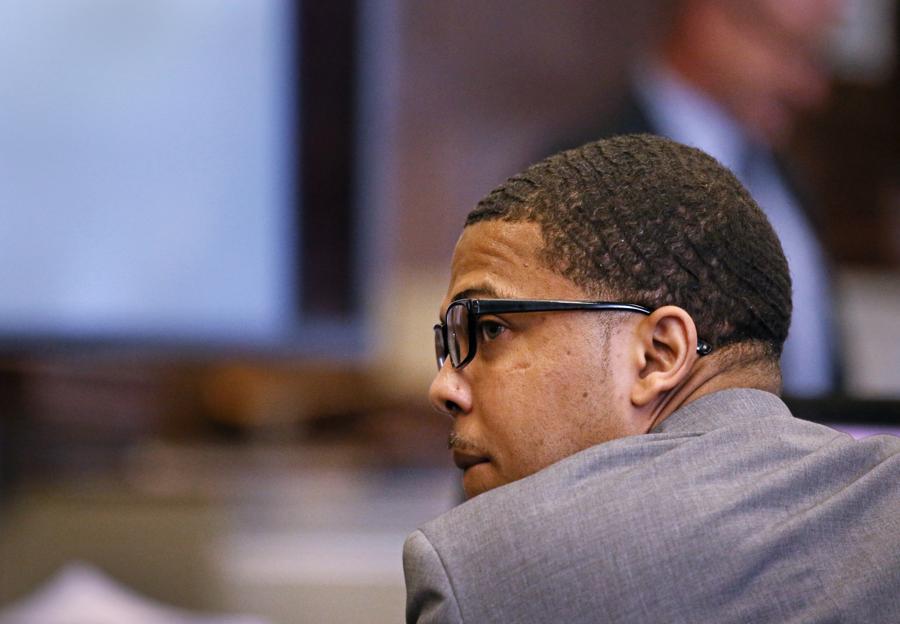
Every time a relative cuts his hair, 6-year-old Marcus Hall II wails, tormented by the memory of his father’s murder more than two years ago behind a Mattapan barbershop while Marcus got a haircut inside.
On Monday, relatives of the victim, 31-year-old Marcus Hall, confronted the Dedham man convicted last week of carrying out the slaying, telling defendant William Shakespeare that he senselessly took the life of a devoted father when he fired the fatal shots.
“Finally I get to see the person [who] killed my son’s father while my son was there,’’ Shiaka McIntoshsaid in a victim-impact statement in Suffolk Superior Court. “Not only did William take Marcus from us, he took my son’s innocence away.’’
McIntosh, wearing a shirt that said “Long Live Marcus,’’ told the hushed courtroom that her son becomes distressed whenever family members trim his hair, a ritual he normally shared with Hall, who took him to the Hair It Is barbershop on June 14, 2016, the day of the murder.
“He’s screaming . . . no matter who does it,’’ McIntosh said. “It’s like death all over again, or him watching his father die all over again.’’
Shakespeare, 30, sat next to his lawyer, James Greenberg, during Monday’s hearing and showed little emotion. He wore a white collared shirt, red tie, and tan slacks, and his ankles remained shackled as he sat at the defense table.
A jury convicted Shakespeare of first-degree murder and firearm offenses on Friday in the early afternoon slaying behind the barbershop on Blue Hill Avenue. He was sentenced Monday to a mandatory life term without the possibility of parole.
The state’s highest court automatically reviews first-degree murder convictions.
During the trial, prosecutors told jurors that Shakespeare and Hall had argued inside the shop before the altercation continued outside, where Shakespeare fired five shots, mortally wounding Hall while his son was finishing up his haircut.
“Marcus didn’t die a coward,’’ McIntosh said. “He didn’t die scared of the killer. He died knowing his son was OK.’’ She added that Hall was “willing to die for his son.’’
During opening statements at trial, Assistant Suffolk District Attorney Catherine Ham told jurors the verbal confrontation between Hall and Shakespeare was captured on video surveillance, but she didn’t indicate what the men argued about.
Outside the courtroom Monday, McIntosh said “we still don’t know.’’
Greenberg suggested at trial that his client and Hall may have been merely “conversing’’ in the video footage and said another man stared at Hall before the shooting.
On Monday, both Shakespeare and Greenberg silently shook their heads when Superior Court Judge Christine Roach asked whether either of them wanted to address the court.
Hall’s mother, Francine Tymes, also gave a victim-impact statement before Roach sentenced Shakespeare.
“In the beginning, the impact of my son’s death was a complete shock to me,’’ Tymes said. “I completely shut down. . . . I could not eat, I could not sleep, my hair was falling out, and I was crying uncontrollably.’’
While her family continues to grieve, Tymes said, she also feels badly for relatives of Shakespeare, who is married with children of his own.
“His family is also affected by his own actions,’’ she said. “Not once has he thought about what he’s done to his own family.’’
Meanwhile her grandson, she said, will “have to live in this world without his father’s guidance. . . . His father died protecting him.’’
Tymes’s words were echoed Monday by Suffolk District Attorney Daniel F. Conley.
“Marcus Hall faced an armed gunman alone rather than put his son in danger by fleeing inside,’’ Conley said in a statement. “His last act on this earth was to protect the child he loved.’’
Family members said that in addition to doting on his son, Hall cared deeply for his community and had started an anti-violence foundation called Brothers Out of the Hood.
Tymes, speaking from the witness stand, noted that Shakespeare will one day have to tell his children about his starkly different legacy when they visit him in prison.
“This is where he himself . . . [will] tell his kids that he viciously and maliciously killed someone else’s father,’’ Tymes said.
Travis Andersen can be reached at travis.andersen@globe.com.



